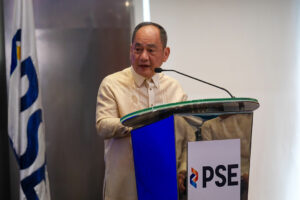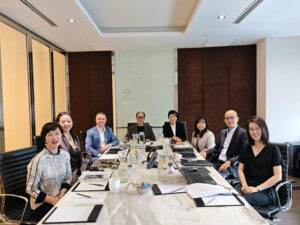THE PHILIPPINE Stock Exchange (PSE) is still finalizing rules and regulations for its planned global Philippine depositary receipts (GPDRs), delaying the product’s launch.
PSE President and Chief Executive Officer Ramon S. Monzon said the exchange is working with the Securities and Exchange Commission (SEC) to address comments on its initial draft of the GPDR trading rules.
“We submitted our initial proposed rules for the trading of the GPDRs. We received comments from the SEC at the end of May, and (we are) working to address those comments. It’s still an ongoing process to finish the rules to govern the GPDRs,” he said during a recent virtual briefing.
The PSE was initially scheduled to launch GPDRs in the first quarter of this year. GPDRs are peso-denominated instruments that represent an economic interest, but not voting rights, in an underlying security listed on an overseas exchange.
Aside from GPDRs, Mr. Monzon said the PSE is also still working on the launch of derivative offerings, including PSE index futures.
The PSE is targeting to launch its derivative products by the first quarter of 2026.
The derivatives market consists of instruments whose values are derived from other underlying assets. Derivatives include options and futures contracts.
“We are working together with other exchanges who have very extensive experience in derivatives to help us in our journey here. But that’s something we planned for 2026,” Mr. Monzon said.
Mr. Monzon also said that Republic Act No. 12214, or the Capital Markets Efficiency Promotion Act (CMEPA), has expanded the definition of securities, removing ambiguity around products such as GPDRs and derivatives.
“The CMEPA has introduced a very specific provision expanding the definition of securities to include other securities in addition to stocks. Depositary receipts and derivatives should be covered by that. That ambiguity has been addressed by the CMEPA,” he said.
On its proposed index policy revisions, Mr. Monzon said the PSE is in the process of reviewing comments it received from market players.
“We’ve received the comments. We are in the process now of going over them and getting clarification. It’s in the process,” he said.
Last month, the PSE sought comments from select fund managers, as well as local and foreign brokers, on its proposed index policy revisions.
One of the proposed changes is the lowering of the free float requirement to 15% from the current 20% for companies with a market capitalization of over P120 billion.
Meanwhile, Mr. Monzon said he is expecting more partnerships with universities and other academic institutions to boost capital market education in the country.
He said this as the PSE recently partnered with San Beda University’s (SBU) College of Arts and Sciences – Departments of Accountancy, Economics & Public Policy, and Financial Management to push capital market education.
SBU is the PSE’s first partner school for integrating investor education into the academic program of its target departments.
The initiative will consist of seminars, workshops, and other relevant engagements to promote and strengthen financial and stock market literacy among SBU students.
The two groups will also organize an internship program and explore offering the PSE’s Certified Securities Specialist Course through SBU.
“We hope to develop money management skills among students and help them understand the value of investing so they are equipped to handle their finances even before joining the workforce or starting their own business,” Mr. Monzon said. — Revin Mikhael D. Ochave






